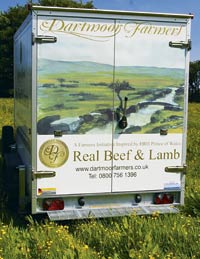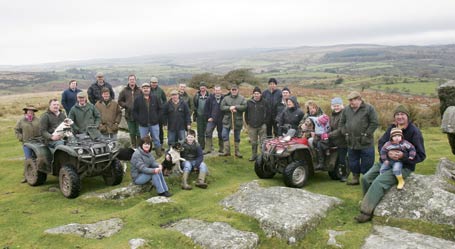Dartmoor farmers collaborate on red meat brand

A group of Dartmoor farmers is collaborating in a pioneering venture designed to secure a market for meat produced within the National Park.
The initiative, which has won the support of Prince Charles, involves 35 producers who have formed the Dartmoor Farmers Association to market native-breed beef and sheep produced on their farms.
Members, who can join only by invitation, are bound by agreed principles and strict production criteria. But the aims are simple – to enable them to continue working the moor and, in so doing, preserve the landscapes that so many people visit and enjoy. “Dartmoor on a plate” is the project’s strapline.
“We want to move away from the commodity-driven supply to the premium-branded quality, traceable market,” says farmer and Dartmoor Farmers director Mat Cole. “We can deliver first-class, native grass-fed beef and lamb, with strong environmental and socio-economic provenance. We want to use the ‘story’ of our farming system to access new markets and build links direct to the consumer.”

It is a “win-win” situation, says Mr Cole, who in partnership with his brother Neil runs 700 ewes and 100 head of cattle on ground that was previously part of Dartmoor Prison’s farm at Princetown.
Consumers will get access to top-notch meat, farmers will ensure their own survival and one of the nation’s iconic landscapes will be preserved for future generations of the public to enjoy.
Branded meat
The ultimate vision is to market, as red meat, a big portion of the 10,000 lambs and 2000 cattle available annually from those in the association.
It is early days for the group in terms of selling their branded meat, but DFA’s roots can be traced back to 2003, when the National Park Authority established the Dartmoor Hill Farm Project to help farmers develop new opportunities.
The DFA was formed in April 2007 as a first step towards establishing a farmer-owned company or co-operative to sell a branded red-meat product. This, in turn, led to the creation of Dartmoor Farmers Ltd (DFL), which opened for business in November 2008.
“We found there was not much help out there to enable us to decide whether to form a co-op or a limited company,” says Mr Cole. “In the end, we decided to form a trading company called Dartmoor Farmers with four farmers as directors because we thought that would be easier for decision-making purposes and be more efficient.”
All DFA members were invited to become members of DFL and invest £500 each to pump-prime the business and fund purchases such as a £10,000 delivery trailer. Some 29 of the 35 DFA members took the opportunity to invest in DFL, which entitles them to an annual dividend. DFA members who have not invested can still supply the company.
The group has started by selling boxed beef and lamb direct to consumers through a website, www.dartmoorfarmers.co.uk. A small 6kg beef box retails for £69, while a 14.5kg lamb box is £120. DFL has sought to supply local butchers, and high-end pubs and restaurants, and is also exploring opportunities with bigger retailers.
Sales are relatively small, but are growing steadily, says Mr Cole. The group has a part-time member of staff whose main focus is on nurturing existing and new customers. Such is the group’s commitment to the project that producers are currently receiving no premium for animals sold through the brand. But that will change, says Mr Cole.
“At the moment, we are only paying market price (£2.75/kg dwt for cattle) for animals because levels are high anyway,” he says. “But everyone accepts this because we want to move the business forward and we need to increase throughput. People should start seeing a premium once prices drop back more generally.”
It may be the common ground of traditional practices and historic connections with the area that has drawn these farmers together, but it is clear they have a modern approach. Not only are the farmer members showing a new willingness to work together – they are also partnering other organisations, such as Devon Renaissance and the Duchy of Cornwall. These bodies, along with others, such as the Dartmoor National Park Authority and the Dartmoor Sustainable Development Fund, have helped the group with their business planning as well as providing funding to help take the project forward. In total, the group has received about £90,000 in funding over the past two years to cover legal costs, branding, company formation, promotion, the trailer and a start-up manager.
The recession has been a challenge, but members have vowed it will not beat them. “DFL knows nothing else,” says Mr Cole. “We started trading in 2008, so we start at the bottom and will fight our way to the top.
“The low exchange rate and resulting higher livestock prices have eased the farmers’ plight in the hills. However, we still believe we have a part to play. We recognise the global market for exports will not always be as favourable and we still have to work hard to attain the best possible market for members in the medium and long term. Our aim was – and still is – to work together to secure a farming future on Dartmoor.”

